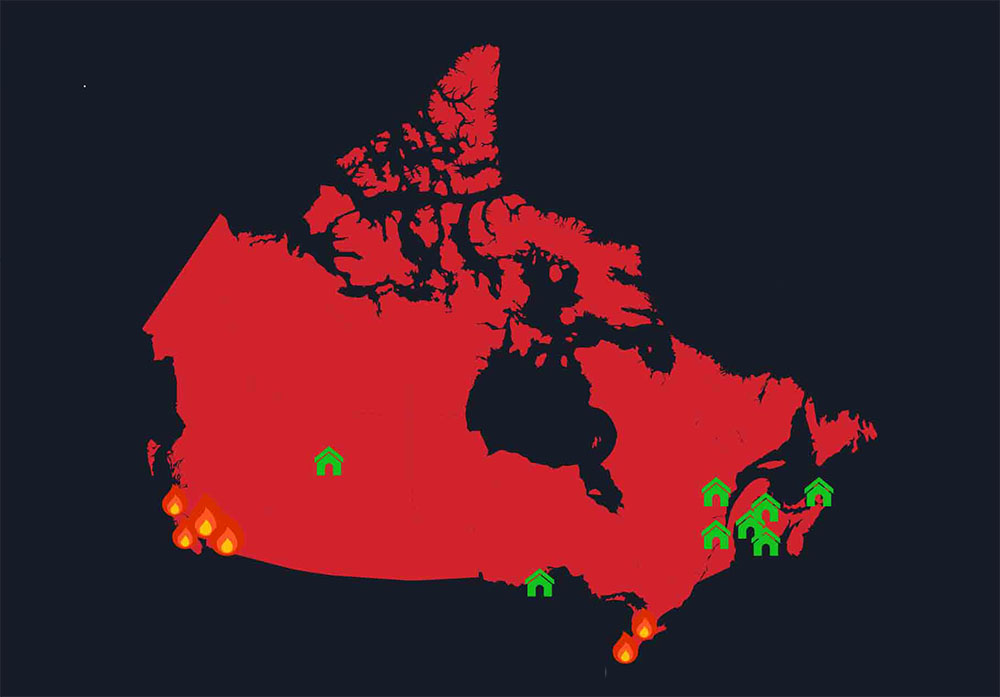The federal government has made misguided mortgage policies in recent years. The first, in 2015, was to raise the amount that CMHC mortgages required for a down payment. The second, in 2016, was to increase the stress test. The third, in 2017, was that the mortgage...
Housing Affordability
How Federal Policy Mishandled Mortgages – Part 1
The federal government has made misguided mortgage policies in recent years. The first, in 2015, was to raise the amount that Canadian Mortgage and Housing Company (CMHC) mortgages required for a down payment. The second, in 2016, was to increase the stress test. The...
Housing Affordability in Canada 2020
There has long been concern about deteriorating housing affordability in Canada. The OECD has expressed concerns about the decline of the middle-class in Canada and the substantial role of house price increases. Two of the 10 least affordable major markets are in...
Housing Affordability In Canada 2020 Index
There has long been concern about deteriorating housing affordability in Canada. The OECD has expressed concerns about the decline of the middle-class in Canada and the substantial role of house price increases. Two of the 10 least affordable major markets are in...
Featured News
Coal – Not Wind – is Keeping Saskatchewan’s Lights On
While it’s not the same minute-by-minute data provided by the Alberta Electric System Operator for their grid, SaskPower has begun breaking down where its power is coming from on a daily basis. And the data from Oct. 3 and 4 showed wind generated an average of just...
57 Policy Proposals for Future Leaders to Help Make the Canadian Economy Soar
Executive Summary The various federal political parties are all promoting the policy agendas they believe will foster a sustainably high quality of life for all Canadians. It remains to be seen whether they will attain the success that they aim to achieve. In some...
Rooming House Options In Regina
Last week the city of Regina held a public meeting about Rooming Houses in the city. The meeting is part of a wider process the council is going through to try to address the dramatic housing shortage the city faces. There have been concerns from some communities,...
Winnipeg Renters Should Welcome New Condo Developments
The Corydon Avenue BIZ announced today that a new condo development containing 125 units scattered throughout 13 buildings in the Corydon/Osborne area is in the works. Predictably, knee jerk condo opponents are lamenting that new condo developments do nothing for the average renter. As it happens, they do.
Urban Policy: A Time for a Paradigm Shift
This policy paper examines current attempts to increase urban densification in Canada’s metropolitan areas, and makes a common-sense but unorthodox argument that cities would be better off embracing urban dispersion.
Public Transit is Better, but Cars Are Faster
Transit may be the better way, but it is certainly not the faster one. The latest data from Statistics Canada has revealed the most avoided truth about commuting: Transit commutes are 81-per-cent longer than those by car.
Kiwis Have Eye on Housing Affordability
If we are looking for pragmatic solutions to make our housing more affordable in Saskatchewan or Canada, we should take note of the latest changes in public policy in New Zealand.
There’s More to New Neighbourhoods Than Houses
When setting in place a research agenda that seeks to examine both the costs and benefits of growth and development, it’s important to keep property tax discussions and the related operating budget issues separate from capital budget matters and development costs.
Poverty and Growth: Retro-Urbanists Cling to the Myth of Suburban Decline: Suburbs have more poor people mainly because they have more people, write Joel Kotkin and Wendell Cox.
In the wake of the post-2008 housing bust, suburbia has become associated with many of the same ills long associated with cities, as our urban-based press corps and cultural elite cheerfully sneer at each new sign of decline, most recently a study released Monday by the Brookings Institution—which has become something of a Vatican for anti-suburban theology—trumpeting the news that there are now 1 million more poor people in America’s suburbs than in its cities.
Speaker Argues Against Compact Cities
Participants at a housing innovation and infrastructure forum heard a defence of detached housing and against compact cities. Wendell Cox, an international public policy consultant specializing in urban policy, transport and demographics, told the audience at the forum cities that have urban containment policies push up housing prices and make them less affordable.
Manitoba Aims to Expedite Subdivision Approvals
Finally, what appears to be some good news out of Manitoba. Winnipeg in particular needs to accommodate population growth for the first time in a long time. Modernizing the approval process for subdivisions could help meet that demand. Additionally, it should hopefully help take some pressure off of the rental market in Winnipeg, which has a vacancy rate of less than one percent.



